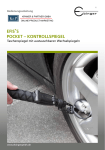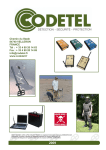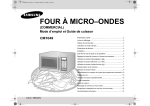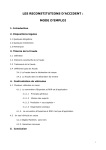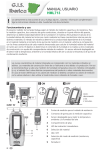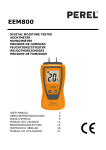Download UWEX 722 C Specifications
Transcript
UWEX® 722 C Underwater Metal Detector Operations Manual Operations Manual UWEX® 722 C _________________________________________________________________________ 2 Contact Information Copyright Ebinger Prüf- und Ortungstechnik GmbH Hansestr. 13 51149 Köln / Cologne Deutschland Tel: +49-2203-97710-0 Fax: +49 2203-36062 Email: [email protected] Web: www.ebinger.org © 2005, Ebinger Prüf- und Ortungstechnik GmbH. Ebinger Prüf- und Ortungstechnik GmbH Außenstelle Wiesbaum Vulkanstraße 14 54578 Wiesbaum Deutschland Tel: +49-6593-9989-40 Fax: +49-6593-9989-50 Email: [email protected] Web: www.ebingergmbh.de Technical Specifications Unauthorized duplication and distribution of this manual or parts of it violates international copyright law and may require the permission of the copyright holder. Violation will be subject to legal prosecution and compensation claims. All rights for trademarks design and patent application reserved. Printed in Germany. Trademark Ebinger reserves the right to change the design or technical specifications for product improvement without prior notice. The information included in this document refers to the complete product range. For inquiries of technical data of specific detector versions indicate the type designation and serial number. The Ebinger-Logo is a registered trade mark of Ebinger Prüf- und Ortungstechnik GmbH. Registered trade names EBEX® MAGNEX® MAILEX® PASSEX® TREX® UPEX® UWEX® EPAD® EPAS® are properties of Ebinger Prüf- und Ortungstechnik GmbH. All trademarks mentioned in the manual are the properties of the registered owners. ® OP UWEX 722Ce 5/07 ___________________________________________________________________ © 2005, Ebinger Prüf- und Ortungstechnik GmbH. Operations Manual UWEX® 722 C 3 _________________________________________________________________________ READ INSTRUCTIONS IN CONJUNCTION WITH YOUR STANDARD OPERATING PROCEDURES (SOP’S) BEFORE DETECTOR USE - READ THIS MANUAL CAREFULLY BEFORE ASSEMBLING, OPERATING OR CARRYING OUT MAINTENANCE ON THE DEVICE. KEEP THIS BOOKLET IN A SAFE PLACE FOR FUTURE REFERENCE. - USE AND MAINTENANCE OF THE DEVICE. EBINGER CANNOT BE HELD RESPONSIBLE FOR ANY DAMAGE RESULTING FROM PROCEDURES, WHICH ARE NOT EXPRESSLY INDICATED, IN THIS MANUAL. - USING THE DETECTOR OTHER THAN SPECIFIED IN SOP’S OR INSTRUCTIONS MAY RESULT IN A NON DETECTION OF THE SEARCH TARGET. EBINGER WILL NOT BE HELD RESPONSIBLE FOR ANY DAMAGE RESULTING FROM IMPROPER USE OF ITS EQUIPMENT. - AS WITH ALL EQUIPMENT CARE SHOULD BE TAKEN TO AVOID DAMAGE AS A RESULT OF NON-INTENDED USE. - DO NOT WASH THE DEVICE WITH LIQUID DETERGENTS OR CHEMICAL SUBSTANCES. USE A SLIGHTLY MOIST, NON-ABRASIVE CLOTH FOR CLEANING. - READ THE CHAPTER ON “MAINTENANCE” CAREFULLY BEFORE CALLING THE EBINGER SERVICE. WHATEVER THE PROBLEM, ONLY TRAINED SERVICE PERSONNEL SHOULD SERVICE THIS EQUIPMENT. - DO NOT LEAVE BATTERIES (DRY OR A RECHARGEABLE TYPE) IN THE DEVICE DURING STORAGE OR FOR EXTENDED PERIODS OF TIME. - DO NOT DISPOSE OF USED BATTERIES IN GENERAL RUBBISH BINS; USE PUBLIC BATTERY COLLECTION FACILITIES AS PER LOCAL REGULATIONS, OR RETURN THEM TO AN EBINGER OFFICE. IF THE EQUIPMENT IS TO BE DISPOSED OF, REMOVE THE BATTERIES AND DISPOSE OF THEM SEPARATELY. WARRANTY CONDITIONS - EBINGER AGREES TO REMEDY ALL DEFECTS IN THE GOODS, WHICH ARISE FROM FAULTY MATERIAL OR POOR WORKMANSHIP BY EITHER REPAIR OR REPLACEMENT OF THE DEFECTIVE PART AT OUR FACTORY, PROVIDED THAT EQUIPMENT IS HANDLED, OPERATED AND MAINTAINED AS PER INSTRUCTIONS ISSUED BY US. THE PROVISION OF WARRANTY TO BE PROVED LOCALLY BY …… THE GUARANTEE IS VALID FOR A PERIOD OF …… MONTHS AFTER DELIVERY. ___________________________________________________________________ © 2005, Ebinger Prüf- und Ortungstechnik GmbH. Operations Manual UWEX® 722 C _________________________________________________________________________ 4 ___________________________________________________________________ © 2005, Ebinger Prüf- und Ortungstechnik GmbH. Operations Manual UWEX® 722 C 5 _________________________________________________________________________ Contents 1. General Safety information 6 2. General 11 3. Principle of operation 11 4. Main characteristics 13 5. Constructional features 14 6. Putting into operation 15 7. Testing before use 16 8. Detector use 17 9. Suppression of interference 18 10. Battery change 20 11. Maintenance 21 12. Technical Data 22 ___________________________________________________________________ © 2005, Ebinger Prüf- und Ortungstechnik GmbH. Operations Manual UWEX® 722 C _________________________________________________________________________ 6 1. General Safety Information This chapter contains important safety information, which has to be observed when using the detector. About this manual Important! • Please read and observe the following instructions before prior to the use of the detector: • You should carefully read the operation manual, before assembly, preparation for usage or operating the equipment. • Follow the instructions of this manual for all operation steps with the device! EBINGER and its representatives are not to be held responsible for any damage caused by actions, which are not described in the manual. • The detector should be used only in the manner as agreed and described in the manual! • Warnings, cautions, notes, and tips contain useful or very important information for the user and are marked as follows: WARNING – Warnings alert you to situations that could cause personal injury. These statements are to be considered absolute and to be adhered to! Caution - Cautions alert you to situations that could cause device damage or unrecoverable data loss. These statements are to be considered absolute and to be adhered to! Note – Notes give you information where non-observance can lead to problems during the service of the device. Tip - Tips give you information where observation can assist in better use of the product. ___________________________________________________________________ © 2005, Ebinger Prüf- und Ortungstechnik GmbH. Operations Manual UWEX® 722 C 7 _________________________________________________________________________ Product Safety Advice Technical failures WARNING – Do not use equipment with damaged cables or connection elements as you are risking short circuits, burns or electric shock! Replace faulty or missing components only by original EBINGER-spare parts to avoid short circuits, wrong polarity, electric shocks or overload. Do not carry out maintenance procedures, which are not mentioned in this manual or which were not part of instructions given by the manufacturer. Tip – In case of malfunction read relevant chapter of this handbook before intervention to the device or before contacting the EBINGER service. Detectors with loudspeakers WARNING – Continuous exposure to strong noise or short exposure to noises of very high intensity can cause damage to the human hearing! Follow the instructions hereafter: • Switch on equipment before fitting headset. Battery or rechargeable battery operated devices WARNING – Batteries and rechargeable cells might explode in case of exposure to fire, misuse or abuse! Pay attention to following recommendation: • Use only batteries or secondary cells of the type indicated in the manual. • Watch for correct polarity • Do not expose batteries to very high temperature or fire • NEVER TRY TO RECHARGE DISPOSABLE DRY BATTERIES • In case off short circuit rechargeable batteries can supply strong currents, which may cause sparks or burn the isolation. • Keep battery contacts dry and clean and avoid contact with metal or conductive material Caution – Follow instructions to avoid damage to equipment: • Remove batteries and dry equipment before storage • Damage caused to batteries by deep unloading is not covered by warranty. • Make sure that voltage and frequency of the mains power supply is appropriate for the chargers and that chargers are suitable for the rechargeable batteries. Note – Watch local regulations for disposal of used batteries. How to clean the device Caution – Do not clean the device with chemical substances as they might interact with equipment components or their surfaces. For cleaning use a soft and wet cloth. ___________________________________________________________________ © 2005, Ebinger Prüf- und Ortungstechnik GmbH. Operations Manual UWEX® 722 C _________________________________________________________________________ 8 Awareness whilst operating the product WARNING – Equipment, which is used in danger inclined activities, shall only be operated according to valid SOPs and by qualified personnel which has been successfully trained according to the relevant national and international standards and regulations. WARNING – Active metal detectors: The suitability of such devices and its safeness has to be approved by the relevant authority. Check for medical suitability in case operators carry medical implants. WARNING – Active metal detectors The device is designed as a support tool for the location of metal objects. The device preferably detects metal with high electric conductivity. Each signal can indicate a possibly dangerous object (i.e. munitions) Very small objects or objects made from special alloys or certain types of wires may not be detected. Make sure the relevant authority checks the suitability of the device before deployment and use. Application in EOD and BAC working environments WARNING –If detectors are used as an auxiliary means in munitions clearance make sure personnel holds relevant qualification, which is in accordance with national and international standards. WARNING – Active metal detectors The device was designed as a metal detector. The device preferably detects metal with high electric conductivity. Each signal can indicate a possibly dangerous object (i.e. munitions) Very small objects or objects made from special alloys or certain types of wires may not be detected. Make sure that the relevant authority checks suitability of the device before deployment and use. Certain munitions contain sensors, which are sensitive to electromagnetic fields. Despite successful tests on a wide range of munitions, the detectors and their suitability have to be checked and approved by the relevant authorities before use. WARNING – The device is designed as an auxiliary means for the location of metal objects. Non co-operative ground can interfere to the detection performance of the device. Make sure that the relevant authority has approved the equipment before it introduced into operation. Application in Archaeology Working Environments WARNING – The device is designed as a support tool for the detection of metals. Each detection signal can indicate munitions or potentially dangerous objects. Adhere to your authority’s regulations and instructions regarding explosive devices! Accidentally found munitions shall remain untouched. Secure area to prevent inexpert intervention. Inform local police or bomb disposal authority. ___________________________________________________________________ © 2005, Ebinger Prüf- und Ortungstechnik GmbH. Operations Manual UWEX® 722 C 9 _________________________________________________________________________ Good Guidance German regulations and instructions on how to deal with unexploded ordnance found by accident may serve as guidance: • All munitions found shall not be touched, its position shall not be changed, the site shall be clearly marked and precautions taken to avoid intervention of the munitions by third parties. Inform your local police or EOD service. ___________________________________________________________________ © 2005, Ebinger Prüf- und Ortungstechnik GmbH. Operations Manual UWEX® 722 C _________________________________________________________________________ 10 Pic. 1 UWEX® 722 C with single sided headset ___________________________________________________________________ © 2005, Ebinger Prüf- und Ortungstechnik GmbH. Operations Manual UWEX® 722 C 11 _________________________________________________________________________ 1. General The UWEX® 722 is a high sensitivity eddy current metal detector for underwater and normal land use. It is Nato Stock coded under no. 6695 - 12 - 319 – 4209 and operates on the pulse induction electronics as used in the EBEX 420 PB family (NSN 6695 - 12 319 – 4209). The UWEX® 722 detects ferrous and non – ferrous metals and alloys. The detector transmits an electromagnetic field of low intensity and indicates metal objects by an audio signal in the headphone, which is connected, to the electronics by a spiral cable. The headset can be used with dry or wet diving suits as the spring clip can be dismantled from the headset. The short detector length and the one-knob operation makes it a handy and easy to use for divers and for underwater EOD. In normal land use it can be applied in extended version by use of an extension rod, which is screwed to the rear of the detector handle. The search device is waterproof to a depth of approx. 70 m. Safety advise: Despite successfully testing of the detector electronics and components in various NATO countries it can not be excluded that the device may interact with improvised or future 'smart' sensors. Check for appropriateness to application before use. Pic. 2 Underwater metal detector UWEX® 722 with extension rod Due to it’s high sensitivity, short length and special design the UWEX® 722 has a wide field of application in underwater detection and if used with extension rod in normal land use. 3. Principle of Operation The UWEX® 722 C works on the Ebinger pulse induction method which can also be applied in conductive salt water. In such case the delay adjustment needs correction (see page 14) ___________________________________________________________________ © 2005, Ebinger Prüf- und Ortungstechnik GmbH. Operations Manual UWEX® 722 C _________________________________________________________________________ 12 Short magnetic pulses, emitted by the search coil generate an electromagnetic field around the search head which induces eddy currents into conductive objects (i.e. metal) being within the reach of the detector. Fig. 1 : transmitted field and response field These eddy currents cause a secondary field, showing a decay characteristic specific to the object. The shape of the curve of the magnetic echo as a function of time depends of size and material of the detected object and is shown in Fig. 2. transmission pulse decaying response signal from target 0 1 2 3 T Fig. 2 Response field from mine and field decay in theory At „0“ a direct current is sent to the search coil generating a square wave pulse. It is cut off at „1“.The secondary field (the magnetic echo) surrounding any conductive objects which are within detector reach will show their maximum response value at „2“ after which they decay with a characteristic shape and angle. At „3“ the detector's receiver circuit is put into operation. It detects the response signal by the search head, amplifies the electric values and transforms them into and audible alarm signal. In reality several hundred pulses are sent out and hundreds of single measurements will be read every second. This allows n uninterrupted continuous search. ___________________________________________________________________ © 2005, Ebinger Prüf- und Ortungstechnik GmbH. Operations Manual UWEX® 722 C 13 _________________________________________________________________________ The main advantage of the pulse induction method consists in the possibility to exclude the reading of interference with short responses signals by a delayed activation of the receiver. Interference from conductive soil, salt water or small metal scrap, i.e. nails or wires, can be strongly reduced by a decoupling in time. Fig. 3. Interference suppression by delayed receiver start at 3 detecting only the response signal from the larger metal object 4. Main characteristics Compact tool, good ergonomics High sensitivity to small objects of weak conductivity, large detection range. Interference suppression and pinpoint target location by static search mode Target acquisition indicated by audio or by LED indication ___________________________________________________________________ © 2005, Ebinger Prüf- und Ortungstechnik GmbH. Operations Manual UWEX® 722 C _________________________________________________________________________ 14 5. Constructional features The UWEX® 722 C is a battery operated, pressure waterproof metal detector for underwater and normal land use. It consists of a search head with joint, which is flanged to the detector handle containing the detector electronics and the battery compartment. The controls consist in a rotary ON/OFF switch and a sensitivity adjuster on top of the search head flange. Audio signals are transmitted to the operator by a headset with extension cable. The spring clip and the rubber cap can be dismantled from the headset to allow its use with a dry diving suit. The detector is powered by one 9 Volt block battery (PP3 type) alkaline or U9VL lithium type. To increase detector length an extension rod can be screwed between search head and electronics cylinder. The equipment is supplied in its canvas satchel for field transport. For storage and road/sea/air transport a transit case is available. transport satchel extension rod detector headset battery & charger Pic. 3: Equipment components ___________________________________________________________________ © 2005, Ebinger Prüf- und Ortungstechnik GmbH. Operations Manual UWEX® 722 C 15 _________________________________________________________________________ 6. Putting into operation For standard underwater use the detector may be used in its short version. For normal land use or when working in underwater vegetation the extension rod can be fitted to the threaded end of the detector handle if the slope is inserted into the extension rod. Pic. 4: UWEX® 722 with extension rod How to put the detector into operation ON/OFF Hold UWEX® 722 detector at the search head joint and unscrew handle. Insert a fresh PP3 battery into the battery compartment. Watch polarity, as detector would not work as long as polarity is inversed. Refit handle to detector without applying force. To switch detector ON turn handle by 180° in clockwise direction until the white dots at the handle and at the search head flange are matching and you notice an audio signal in the single sided headset. To switch it OFF turn half turn in anti-clockwise sense until red and white dot match and audio signal stops when metal is brought to the search head. Tuning the sensitivity Release sensitivity control knob at search head joint by anticlockwise rotation. Hold search head clear from metal. Sliding control knob towards the search head increases sensitivity, sliding it towards detector handle reduces sensitivity. Maximum sensitivity is tuned when knob is positioned at a point where the audio signal in the headset is 'just' suppressed. When search approaches a metal object the detector will start to give an audio alarm in the headset. 1. 2. Pic. 5: operation elements ___________________________________________________________________ © 2005, Ebinger Prüf- und Ortungstechnik GmbH. Operations Manual UWEX® 722 C _________________________________________________________________________ 16 A multiple turn calibrator for coarse setting of sensitivity is placed close to the battery contacts inside the handle in the battery compartment. To open the battery compartment unscrew handle. To adjust standard sensitivity slide external sensitivity knob to mid position in its slot and calibrate sensitivity trimmer inside the battery compartment just below the audio threshold (Pict.7). Tuning clockwise increases sensitivity. Make sure that detector has operational temperature before recalibrating coarse sensitivity adjuster. Give at least 25 min. under normal working conditions before such intervention. 7. Pic. 6: detector with handle removed, battery compartment open, 9V lithium PP 3 battery Testing before use Take UWEX® 722 C out from its carrying bag. Unscrew handle. Insert 9V battery watching correct polarity as indicated by markings. Refit handle. To extend detector use extension rod. Rotate handle clockwise into ON position with white dots matching and set sensitivity knob to required sensitivity level. During calibration the detector head must be held approx. 1,5m away from any metal. It may be difficult to calibrate detector inside buildings due to plenty of metal interference. A fresh battery gives approx. audible 1 click every 3 seconds. The click rate increases with dropping voltage. If battery power is below nominal value the detector gives an audio alarm of low frequency (approx. 100Hz) which can not be cancelled using the sensitivity adjuster.. In case of missing clicks or constant alarm detector is not operational. Check battery. ___________________________________________________________________ © 2005, Ebinger Prüf- und Ortungstechnik GmbH. Operations Manual UWEX® 722 C 17 _________________________________________________________________________ Pic. 7: 8. coarse adjuster for sensitivity inside battery compartment Using the detector To inspect an area carry search head in scanning movement flat and parallel over ground. Make sure that searched strips overlap and avoid dead spots. The detector operates on a static mode showing metal objects by an audio alarm as long as the search head is held over a detected object. The intensity of the signal corresponds to the signal strength received from the target. Objects provide the strongest signal when the search head centres over a target. Small objects at close distance will generate a strong but short peak signal, which is spread over a small surface. Several small objects generate a wide spread signal. Large targets even if buried at depth will generate a signal spread over a large surface. A B A - Signal shape for a small shell lying horizontally B – Signal for a large object Fig. 4 different detection alarm signals If the audio signal is spread over a large area lift search coil to improve pinpointing and determination of size and distance of the located metal. ___________________________________________________________________ © 2005, Ebinger Prüf- und Ortungstechnik GmbH. Operations Manual UWEX® 722 C _________________________________________________________________________ 18 For pinpoint location of shallow buried metal the search coil may be used vertically over the signal area. From experience the detection signals can be interpreted in the right way. A small metal object buried next to the surface will cause a short but intense signal. A large metal object buried deep in the ground will cause a wide spread but much weaker signal. A shallow buried large target will generate a wide spread and strong signal which can cover weaker signals from additional small targets. Always recheck area after target removal. Fig. 5:: Pinpointing with rim of detector head 9. Suppression of small objects and interference For difficult detection tasks i.e. to locate minimum amounts of metal select high sensitivity and approach ground as close as possible. Often detection on land or underwater may be interfered by small metal scrap such as nails or pieces of wire. Also salt water can cause unwanted alarms if the search head is changing ground clearance over the seabed. Such interference can be reduced by adjusting the trimmer marked 'Z inside the battery compartment. (<ser.# 436) or by setting the micro switches in the battery compartment to 35 µsec. ___________________________________________________________________ © 2005, Ebinger Prüf- und Ortungstechnik GmbH. Operations Manual UWEX® 722 C 19 _________________________________________________________________________ Pic. 7 Delay adjuster version until serial no 436 Turn upper trimmer marked 'Z' (approx. 3 - 4 turns) in clockwise direction to increase the delay, which reduces interference signals from saltwater and scrap metal. Now recalibrate detector sensitivity to audio threshold (lower trimmer marked 'Tone). To increase detector sensitivity to small metal objects turn adjuster anti-clockwise to lower delay values. Detectors with serial no.> 436 have a double micro switch Pic. 8: Delay switch version from serial no. <436 New detector version (ser.no.>436) with micro switch for DELAY The new detector version has a double micro switch in the battery compartment which replace the previous trimmer for selecting preset delay values. The setting for land use is also recommended for use in fresh / sweet water. ___________________________________________________________________ © 2005, Ebinger Prüf- und Ortungstechnik GmbH. Operations Manual UWEX® 722 C _________________________________________________________________________ 20 FIG. 6: Delay switch inside detector handle 10. Battery change If the device is not used for a long time it may occur that the two O-rings beneath the handle stick to the surface and the handle only comes off after jerky anticlockwise rotation. The UWEX® 722 can be operated by a dry alkaline (6LR22), by a dry lithium (U9VL) battery or by a rechargeable NiMH battery of PP3 style. Operating time of the dry alkaline battery is approx. 20 h. Lithium batteries will provide approx. double the operation time. The lithium battery UV 9L is has a minimised magnetic signature, better temperature range, improved storage life and much higher capacity and should be considered superior to alkaline batteries. Rechargeable batteries must be serviced according to manufacturer instructions. Do not use for more than 1 - 2 hours between charges. After the battery exchange the handle must be refitted. The surface of the sealing ring has to remain clean. For correct sealing it is sufficient to tighten the carrying handle hand tight as the O-rings are a radial seal. Do not force handle to avoid damage to the equipment. Use silicone grease to service the O-ring and thread occasionally. The detector has to be switched off after use to avoid leakage or damage of the rechargeable battery due to complete discharge. If the detector is not used for a longer period remove battery. ___________________________________________________________________ © 2005, Ebinger Prüf- und Ortungstechnik GmbH. Operations Manual UWEX® 722 C 21 _________________________________________________________________________ 11. Maintenance Pre – issue routine: Check equipment is tight, test battery power and detector functions. Routine after use: After use in salt-water wash detector externally with sweet water. Wipe with tissue and dry equipment with open battery compartment for approx. 1 h before storage. Routine upon return to stores: Check for completeness and correct function. Remove battery from battery compartment. Do not store unit when still wet or dirty. 3 Monthly routine: Check for clean surface and that the two O - ring seals are clean and lubrificated with silicone O-ring grease. After equipment cleaning O-ring seals of the handle section shall be greased with silicone grease if dry. Test function with test plate. In case of malfunctioning check battery power and battery contacts for good contact. If the battery is at low voltage the detector will give a permanent signal, which cannot be changed using the sensitivity adjusters. Dead battery will cause a no-signal status. Expert personnel should carry out repair only. A 11 bar pressure test is recommended after intervention to the internal of the detector. Inexpert intervention causes expiry of warranty. Defects in cables due to normal wear and tear are excluded from warranty. ___________________________________________________________________ © 2005, Ebinger Prüf- und Ortungstechnik GmbH. Operations Manual UWEX® 722 C _________________________________________________________________________ 22 12. Technical Data - Power supply. - Service life - Temperature range. Dimensions. - Search head - Length Weight. - Transit case Detection ranges factor* application range − − 1 x 9V E-Block (6LR61 or U9VL) Approx. 20 h (lithium 40 h) at +20° C -20°C to +55°C − − Approx. 200 mm Ø Approx. ø 40mm x 600mm − Short version approx. 60 cm − Long version approx. 118 cm − Approx. 1,6 – 1,8 kg − Approx. 5 kg − approx. 3 top layer of soil between approx. 0,1 to 1 m depending on size, material and position of metal object and local interference *detection range factor describes the system sensitivity in air and without interference. A factor of three means three means that a metal disc of the same size as the search head (here 200 mm) will be detected at a distance of three times of this dimension (equal 60 cm) . ___________________________________________________________________ © 2005, Ebinger Prüf- und Ortungstechnik GmbH.
























